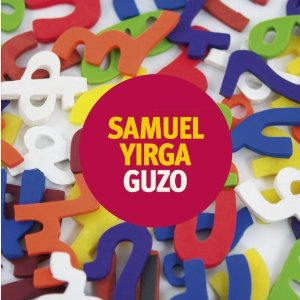I feel conflicted about the debut album from Ethiopia’s Samuel Yirga. On one hand this is obviously a talented young musician at the start of his career, looking to build upon his cameo role within the world fusion group Dub Colossus by stretching out his piano and compositional skills here on Guzo. On the other hand it all feels too convoluted, as if someone has heard this guy play piano, recongised that he’s as adept at both Ethiopian melodies and Western jazz noodling, and realised this could be the point where Ethiopian music can truly cross over into the world music crowd. Essentially this is Ethiopian music for people who can’t take the raw, spontaneous bluster of the Éthiopiques series; people who can’t truly get into world music unless there’s a roll of brushes on the toms, plaintive piano notes sprinkled here and there, a double bass lazily playing scales in the background. Surely there is a genre of music in this world that doesn’t need to be fused with jazz?
In truth, there are moments that work exceptionally well. ‘Firma Ena Wereket’ has the fiercest riff on the album, a wonderfully monstrous thing featuring doubled-up bass and piano, playing call-and-response with the horn section. It has everything you want from Ethiopian music, the strong percussive element, the repetitive groove that never really concludes its melody, the horns that act almost like steam valves relieving the pressure. After a couple of minutes of this Yirga switches into piano virtuoso mode with the riff largely silent, only occasionally coming back into play.
Opening track ‘Abet Abet (Punt Mix)’ shares the same aesthetic as ‘Firma Ena Wereket’, with a mixture of organ and saxophone offering the lead melody in this case. It’s the closest you’ll get to the magic of Getatchew Mekuria or Mulatu Astatke on Guzo. The rest of the album offers a strange mix of subdued piano ballads and odd acid-jazz/fusion pieces. Chief among the latter of these is a cover of Rotary Connection’s ‘I Am The Black Gold Of The Sun’, which serves as nothing more than a “modernised” version of the original, with denser vocals and a deeper groove. Yirga firmly takes a back seat, with last year’s world music discovery The Creole Choir of Cuba taking over the track with their multi-layered (and quite impressive) harmonies. Yet it’s hard not to be suspicious that this track, and the collaborators, had been chosen with commercial aims in mind.
The slower jazz pieces, which make up most of the album and which feature Yirga at his most prominent, often recall Canadian pianist Oscar Peterson. They certainly have that same relaxed vibe about them, ocassionally too fussy for their own good, but when contemplative using silence and every note carefully in order to evoke a smoky late-night cafe atmosphere, though with more American than Ethiopian flavours than you might expect. ‘Dance With The Legend’ is probably the best of the piano-led pieces. Its delivery is full of barrages of descending notes with a touch of stride piano in the delivery, as well as an abundane of crashing notes that occasionally make it feel like an overly-dramatic finale to a John Cusack film.
Guzo is a strange album – it feels like the record label (or management) are calling too many shots, unable to decide whether Yirga should play the Ethio-jazz which we’ve come accustomed to through the Ethiopiques series, the cool Western jazz of Oscar Peterson and Bill Evans, or a fusion in-between that also includes soul and Caribbean flavours. Perhaps Yirga is an artist that doesn’t need to take the spotlight, happy to exist in the sideman’s role, even in his own band. This would certainly ring true with this album, especially as the vision is so in-cohesive that we rarely get a sense of who Yirga is as an artist. Is he an Ethiopian in love with his own music? Does he want to be a virtuoso jazz player in the Western sense? Does he really feel comfortable fusing so many styles together? Hopefully some of these questions will be answered better on later recordings.


